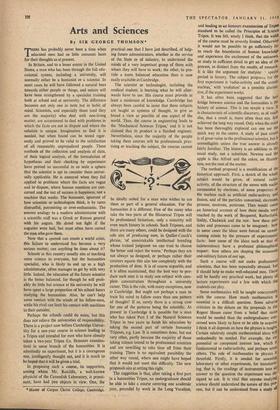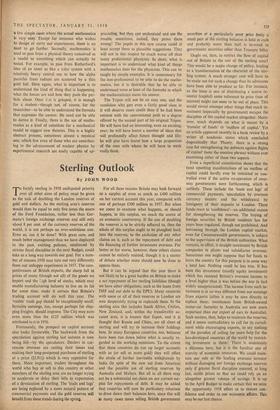Arts and Sciences
By SIR GEORGE THOMSON* THERE has probably never been a time when educated men had so little common basis for their thoughts as at present.
In Britain, and to a lesser extent in the United States, a man who has been through the full edu- cational system, including a university, will normally either be a humanist or a scientist. In most cases he will have followed a natural bent towards either people or things, and nature will have been strengthened by a specialist training both at school and at university. The difference becomes not only one in taste but in habit of mind. Scientists, and especially those (and they are the majority) who deal with non-living matter, are accustomed to deal with problems in which the facts are not in dispute and where the solution is unique. Imagination to find it is needed, but when found can be tested rigor- ously and proved to be valid to the satisfaction of all reasonably unprejudiced people. These methods of the collection and analysis of data, of their logical analysis, of the formulation of hypotheses and their checking by experiment have proved so successful in so wide a sphere that the scientist is apt to consider them univer- sally applicable. He is annoyed when they fail applied to problems where the facts are vague and in- dispute, where human emotions are con- cerned and the test of success is happiness, not a machine that works. The humanist, ignorant of how scientists or technologists think, is by turns distrustful, patronising or over-enthusiastic. The nearest analogy to a modern administrator with a scientific staff was a Greek or Roman general with his augurs. He dared not fight if the auguries were bad, but must often have cursed the man who gave them.
Now that a sputnik can create a world crisis, this failure to understand has become a very serious matter; can anything be done about it?
Schools in this country usually aim at teaching some science to everyone, but the humanities specialist, who is likely to end up as a high administrator, often manages to get by with very little. Indeed, the education of the future scientist is the better balanced, for though he will prob- ably do little but science at his university he will have spent a large proportion of his school hours studying the humanities. Also, he can't help some contact with the minds of his fellow-men, while his rival can limit his contact with machines to their outsides.
Perhaps the schools could do more, but this does not relieve the universities of responsibility.
There is a project now before Cambridge Univer- sity for a one-year course in science leading to a Tripos and intended for men who have already taken a two-year Tripos (i.e. Honours examina- tion) in some branch of the humanities. It is admittedly an experiment, but it is a courageous one, intelligently thought out, and it is much to be hoped that it will be given a trial.
In proposing such a course, its supporters, among whom Mr. Ratcliffe, a well-known physicist of the Cavendish Laboratory, is promi- nent, have had two objects in view. One, the • Master of Corpus Christi College, Cambridge. practical one that I have just described, of help- ing future administrators, whether in the service of the State or of industry, to understand the minds' of a very important group of those with whom they will have to work; the other, to pro- vide a more balanced education than is now easily available at Cambridge.
The scientist or technologist, including the medical student, is learning what he will after- wards have to use. His course must provide at least a minimum of knowledge. Cambridge has always been careful to insist that these subjects are taught as systems of thought, to give as broad a view as possible of one aspect of the world. Thus, the course in engineering leads to the 'Mechanical Sciences Tripos,' and it is not claimed that its product is a finished engineer. Nevertheless, since the majority of the people taking these courses will be professionals prac- tising or teaching the subject, the courses cannot be ideally suited for a man who wishes to use them as part of a general education. For the humanities it is different. Few of the many who take the two parts of the Historical Tripos will be professional historians, only a minority will even teach history in schools. Such Triposes, and there are many others, could be designed with the sole aim of producing men, in Quiller-Couch's phrase, 'of unmistakable intellectual breeding whose trained judgment we can trust to choose the better and reject the worse.' Perhaps they are not always so designed, or perhaps rather their creators equate this aim too completely with the production of dons. It is of course arguable, and it is often maintained, that the best way to pro- duce such men is to study one subject with com- plete concentration throughout a university career. This is the rule, with many exceptions, now at Cambridge. But ought not perhaps a man to train his mind to follow more than one pattern of thought? If so, surely there is a strong case for one of the patterns being the scientific. At present in Cambridge it is possible for a man who has taken Part I of the Natural Sciences Tripos in two years to finish his education by taking the second part of certain humanity Triposes, e.g. Law. It is sometimes done, but not very often, partly because the majority of those taking science intend to be professional scientists and are unwilling to take time off from their training. There is no equivalent possibility the other way round, where one might have hoped that it would not meet this difficulty. The new proposals aim at setting this right.
The suggestion is that, after taking a first part in a humanities Tripos, an undergraduate should be able to take a course covering one academic year, preceded by work in the Long Vacation, and leading to an honours examination of Tripos standard to be called the Principles of Science Tripos. It was felt, wisely I think, that the width of the course must' be severely limited. Otherwise it would not be possible to go sufficiently far to reach the boundaries a human knowledge and experience the excitement of the unknown, or study in sufficient detail to get an idea of the process, as distinct from the results, of research- It is like the argument for studying special period in history. The subject propos.:, for the first experiment is 'radio-activity and the atomic nucleus,' with 'evolution' as a possible alterna' tive, if the experiment works.
It has often been suggested that the best bridge between science and the humanities is the history of science. This is too simple a view. It is characteristic of scientific discovery, as of much else, that a result is, more often than not, first achieved the long way round. Only when the maze has been thoroughly explored can one see the quick way to the centre. A study of past errors is of great value to the professional scientist, but is unintelligible unless the true answer is already fairly familiar. The history is an addition to the usual study, not a substitute. Newton and the apple is like Alfred and the cakes, an illustra' tion, not the root of the matter.
The method proposed is a modification of the historical approach. First, a sketch of the whole subject would be given, of natural radio' activity, of.the structure of the atoms with nuclei surrounded by electrons, of some properties of the nucleus such as artificial radio-activity and fission, and of the particles concerned, electrons, protons, neutrons, positrons. Then would come an historical account of how these results were reached by the work of Becquerel, Rutherford, Soddy, Chadwick and the rest : how these par' tides and processes come to be imagined : hoW in some cases the ideas were forced on unwel' coming minds by the pressure of experimental facts : how some of the ideas such as that of indeterminacy have a profound philosophical import : how others are shaping the economic and military future of our age. Such a course will not make professional scientists, that has been repeatedly stressed, but it should help to make well-educated men. There will be hardly any practical work, but plenty 01 lecture experiments and a few with which the students can play.
Some mathematics will be taught concurrently with the course. How much mathematics iS essential is a difficult question. Some adverse criticism in the debate on the proposals in the Regent House came from a belief that more would be needed than the undergraduates con. cerned were likely to have or be able to acquire' I think it all depends on how the physics is taught. Certain relatively simple mathematical ideas will undoubtedly be needed. For example, the c7t' ponential or compound interest law, which is fundamental to radio-activity, and perhaps some others. The role of mathematics in physics i5 threefold. Firstly, it is needed for assessing laboratory or other experiments, for transform' ing, that is, the readings of instruments into ae answer to the question the experiment was dv signed to ask. It is vital that anyone studying science should understand the nature of this pro: cess, but it can be understood from a study 01 few simple cases where the actual mathematics is very easy. Except for someone who wishes to design or carry out experiments, there is no need to go further. Secondly, mathematics is used to pass from a physical theory conceived as a model to something which can actually be tested. For example, to pass from Rutherford's idea of an atom as like a solar system with a relatively heavy central sun to how the alpha particles from radium are scattered by a thin gold foil. Here again, what is important is to understand the kind of thing that is happening, what the forces are and how they push the par- ticle about. Once t:.is is grasped, it is enough for a student—though not, of course, for the researcher—to be able to understand the formula that expresses the answer. He need not be able to derive it. Finally, there is the use of mathe- matics as a kind of substitute for a mechanical model to suggest new theories. This is a highly abstract process, sometimes almost a mystical one, which few even of those who are contribut- ing to the advancement of nuclear physics by experimental research are really capable of ap- preciating, but they can understand and use the results; sometimes, indeed, they prove them wrong! The pupils in this new course could at least accept them as plausible suggestions. They will not in this respect be much worse off than many professional physicists. In short, what is important is to understand what kind of things mathematics does for the physicists. This can be taught by simple examples. It is unnecessary for the non-professional to be able to do the mathe- matics, but it is desirable that he be able to understand some at least of the formulae in which the mathematician states his answer.
The Tripos will not be an easy one, and the candidate who gets even a fairly good class in it will deserve more credit than if he had been content with the conventional path to a degree offered by the second part of his original Tripos. He will have had an interesting, even an exciting, year; he will have learnt a number of ideas that will profoundly affect future thought and life; he will also have learnt how a large proportion of the men with whom he will have to work really think.







































 Previous page
Previous page